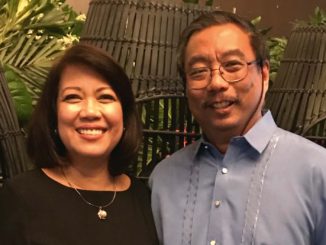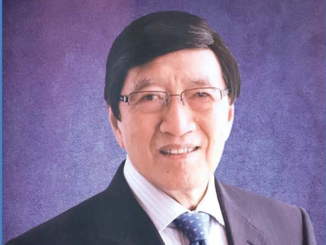
In the end, Maria Lourdes P.A. Sereno brought down Maria Lourdes P.A. Sereno.
The issue against her is in Section 3 Article VIII of the Constitution –“A member of the Judiciary must be a person of proven competence, integrity, probity, and independence.”
On Friday, May 11, 2018, the Supreme Court, voting 8-6, ousted Sereno as chief justice of the land by granting the quo warranto petition of Solicitor General Jose Calida to remove her because she was not qualified to be a chief justice in the first place. The ground for her removal is damning. She lacks integrity. She lacked integrity at the time of her appointment as justice on August 13, 2010 and her appointment as chief justice on August 24, 2012.
She lacks integrity because she failed to file her Statement of Assets, Liabilities and Networth (SALN) in 11 years (1986, 1987, 1988, 1992, 1999, 2000, 2001, 2003, 2004, 2005 and 2006), of the 20 years she was teaching at the state University of the Philippines College of Law. SALN is required of all government workers, except casual workers and laborers.
The decision said:
“It is therefore clear as day that respondent failed not only in complying with the physical act of filing, but also committed dishonesty betraying her lack of integrity, honesty and probity.”
Also, the Supreme Court said Sereno may be held liable “for disbarment for violating the sub judice rule by repeatedly discussing the merits of the quo warranto petition in different fora and for casting aspersions and ill motives to the members of the court even before a decision is made, designed to affect the results of the Court’s collegial vote and influence public opinion. This wrongful actuation exemplifies a poor regard for the judicial system and may amount to conduct unbecoming of a Justice and a lawyer.”
Sereno even claimed the quo warranto was a plot by President Duterte and would destroy Philippine democracy.
The Court said it can no longer tolerate Sereno’s “public actuation showing disdain and contempt towards some members of the Court”.
The youngest chief justice of the land, Sereno, 57, is the first chief justice to be ousted by her own peers.
The decision found Sereno repeatedly lying about her SALNs and even misleading the Judicial and Bar Council, which nominated her as chief justice in July 2012, about the non-existence of her SALNs (she claimed it was “infeasible” to locate them).
Three issues
The high court tried to resolve three issues:
- Whether the Court can assume jurisdiction and give due course to the instant petition for quo warranto against respondent who is an impeachable officer and against whom an impeachment complaint has already been filed with the House of Representatives. Yes.
- Whether the petition is out rightly dismissible on the ground of prescription. No. The government has no prescription when it complains with a quo warranto.
- Whether respondent is eligible for the position of Chief Justice. No.
Though the vote for quo warranto was 8-6, there was perceived dislike for Sereno among her Supreme Court colleagues.
On the third issue (the eligibility of Sereno as chief justice), the vote is actually 9 not 8. Senior Justice Antonio Carpio disagreed that quo warranto was the remedy to remove Sereno. It is impeachment, he said.
The most senior justice, Carpio considers Sereno guilty of culpable violation of the Constitution and betrayal of public trust, two grounds to impeach a justice of the Supreme Court.
Thus, the Senate should impeach Sereno and remove her. Carpio agrees with the view that “culpable violation of the Constitution implies “deliberate intent, perhaps even a certain degree of perversity… to defy knowingly what the Constitution commands”.
Betrayal of public trust refers to acts “less than criminal but must be attended by bad faith and of such gravity and seriousness as the other grounds for impeachment.”
JBC role
Another dissenter, Justice Presbiterio Velasco thinks the Judicial and Bar Council, not the High Court, should be the one to disqualify Sereno as chief justice by nullifying her nomination thru a petition for certiorari. The JBC, under the Constitution and by law, screens candidates for justice and chief justice, and thus establishes aspirants’ integrity.
That should make the vote for removal of Sereno 10-4.
Justice Marvic Leonen also dissented against the grant of quo warranto which he calls “a legal abomination”, “even if the Chief Justice has failed our expectations”. He argued for impeachment in removing impeachable officials.
In his 64-page dissent, Leonen suggests one alternative Sereno should have considered, “to have the grace and humility to resign from her office to protect the institution from a leadership which may not have succeeded to address the divisiveness and the weaknesses within.”
Leonen also didn’t like Sereno showing up for work at the Supreme Court on May 8, 2018, ending her indefinite leave, “without the court’s approval en banc.” “For a party to do everything in her power to undermine the Court for fear of an adverse result may breach not only judicial courtesy but also our professional responsibilities as a lawyer,” Leonen points out.
The tribunal dismissed Sereno’s claim that he filed her SALNs, “only that she has no records of the same.” “It is, however, too shallow and impetuous for this Court to accept such excuse and disregard the overwhelming evidence to the contrary,” sneered the decision.
The Court conclusively established that “for the years 1986, 1987, 1988, 1992, 1999, 2000, 2001, 2003, 2004, 2005 and 2006, respondent (Sereno) did not file her SALNs.”
Sereno not only violated the Constitution and laws of the land by her habitually not filing her SALNs, she also proved that by her failure, she lacks integrity.
Because integrity is a basic qualification for a justice and a chief justice of the Supreme Court, the high court thus found Sereno not qualified to be a chief justice from the very beginning. She is a usurper to the position and thus must be removed immediately.
Disbarment
Sereno has ten days from May 11, 2018 to explain why she should not be subject to other penalties (like disbarment as a lawyer) because of her behavior during the pendency of the case.
Not only did the Court find Sereno not filing her SALNs. She did not file her SALNs “properly and promptly”. Said the decision:
“The failure to file a truthful SALN not only puts in doubt the integrity of the officer, but such failure to file a truthful, complete and accurate SALN would likewise amount to dishonesty if the same is attended by malicious intent to conceal the truth or to make false statements.”
Suspicious circumstances
The Court noted that the SALNs filed by Sereno covering her years of government service in U.P., “appear to have been executed and filed under suspicious circumstances”:
- Her SALN as of Dec. 31, 1996 was accomplished and notarized only on June 29, 1998, or two years late;
- Her SALN as of Dec. 31, 1998 was filed only in 2003, or five years late;
- Her SALNs for the years 1997, 1998, 1999 and 2002 were notarized only on August 21, 2003 ;
- Both the 1996 and 1997 SALNs were subscribed and sworn to by respondent before Zenaida P. Cruz (Administrative Officer IV, Human Resource Development and Records Section, U.P. Law Center) on June 29, 1998. However, under the Notarial Registry of Eugenia A. Borras, four SALNs of respondent were acknowledged before her on August 21, 2003. It appears thus that there were two SALNs for 1997 executed by respondent;
She failed to file her SALNs for 2004, 2005, and 2006 which were the years when she received the bulk of her fees from the PIATCO cases.
Per Sereno’s own admission, she received a total of P30.269 million as government’s lawyer in the PIATCO case: P7.05 million in 2004, P11.53 million in 2005, P2.63 million in 2006, P4.67 million in 2007, P4.07 million in 2008, and P301,552 in 2009.
(e) Her SALN for 2006 was accomplished only on July 27, 2010 and unsubscribed, only to be later on claimed by respondent to have been really intended as SALN as of July 27, 2010;
Irregularities
The decision said, the SALNs that Sereno submitted in support of her application for Chief Justice likewise bear badges of irregularities:
(f) Her SALN for 2009 was not accomplished under oath, was likewise belatedly filed only on June 22, 2012 and indicates therein that she was an Associate Justice of the Court when her appointment came only on August 16, 2010;
(g) Her SALNs for 2006 and 2009 did not reflect the fees she received as counsel for the Republic in the PIATCO cases.
The Bureau of Internal Revenue’s (BIR) Report shows that respondent received from the OSG the total gross amount of P32,494,805.27 as fees from 2004 to 2009 for the PIATCO cases.
The BIR Report also shows that she paid the withholding taxes on said fees in the total amount of P4,599,504.71. By mathematical computation, respondent would have had P27,895,300.56 as her net disposable income. This net disposable income was not reflected in respondent’s SALN for 2006 (which she claims to really be her SALN as of July 27, 2010) nor in her SALN as of 2009. Her SALN for 2009 revealed a net worth of only Pl7,936,353.00;
(h) The unaccounted income from the PIATCO cases could not have been due to losses or liabilities considering that respondent have had an increase in her net worth from 2002 to 2009. Her SALN for 2002 shows a net worth of only P3,804,000.00 while her SALN for 2009 shows a net worth of Pl7,936,353.00, her net worth thus increased by P14,132,353.00. While the BIR Report shows that respondent received approximately P27M in disposable net income, her SALN only shows an increase of approximately Pl4M in net worth. The difference between the two, in the amount of estimatedly Pl3M, was conspicuously missing in the SALNs filed by respondent;
(i) There is a glaring difference between the two 2010 SALNs filed. The total value of respondent’s personal properties in the “SALN as of July 27, 2010” is P9,000,000.00, while the value of her personal properties as declared in her “SALN as of December 31, 2010” increased to Pl1,723,010. Respondent, therefore, enjoyed an increase of approximately P2,700,000.00 in personal properties in just a span of five (5) months after having been appointed as Associate Justice.
(j) It is contrary to human experience that the SALNs purportedly recovered by respondent’s husband were not stamped received by the UP HRDO. It is unusual that respondent did not bother to demand that her personal copy be duly stamped received with particulars as to the date and initial, at least of the party who received the same as proof that she timely filed her SALN.
(k) There is no indication from the stamped “Certified Photocopy” and initialed by Rosemarie Pabiona on the SALNs that she is the official custodian of the same, and whether the photocopies of the original are on file, contrary to Section 24, Rule 1322 of the Rules of Court.
Dishonesty
Said the Court:
“The above circumstances betray respondent’s intention to falsely state a material fact and to practice deception in order to secure for herself the appointment as Chief Justice. It is therefore clear as day that respondent failed not only in complying with the physical act of filing, but also committed dishonesty betraying her lack of integrity, honesty and probity.”
“The filing a SALN is an essential requirement to one’s assumption of a public post. It has Constitutional, legal and jurisprudential bases,” said the 153-page Supreme Court decision written by Justice Noel Tijam.
Article XI, Section 17 of the Constitution mandates that “A public officer or employee shall, upon assumption of office and as often thereafter as may be required by law, submit a declaration under oath of his assets, liabilities, and net worth.”
As early as 1960, Republic Act 3019 , required from every public officer a detailed and sworn statement of their assets and liabilities.”
In 1989, R.A. No. 6713 or the Code of Conduct and Ethical Standards for Public Officials and Employees “was enacted and expanded the obligation to disclose by enumerating the information required to be disclosed as regards the assets, liabilities, business interests and financial connections; requiring the identification and disclosure of relatives in government; making the statements and disclosures available and accessible to the public; and prohibiting certain acts.”
Two years after the birth of the 1987 Constitution, R.A. No. 6713 or the Code of Conduct and Ethical Standards for Public Officials and Employees was enacted and thereby expanded the obligation to disclose by enumerating the information required to be disclosed as regards the assets, liabilities, business interests and financial connections; requiring the identification and disclosure of relatives in government; making the statements and disclosures available and accessible to the public; and prohibiting certain acts.
In particular, Sections 8 and 11 of R.A. No. 6713 provide:
Section 8. Statements and Disclosure. – Public officials and employees have an obligation to accomplish and submit declarations under oath of, and the public has the right to know, their assets, liabilities, net worth and financial and business interests including those of their spouses and of unmarried children under eighteen (18) years of age living in their households.
The two documents shall contain information on the following:
(a) real property, its improvements, acquisition costs, assessed value and current fair market value;
(b) personal property and acquisition cost;
(c) all other assets such as investments, cash on hand or in banks, stocks, bonds, and the like;
(d) liabilities, and;
(e) all business interests and financial connections.
The documents must be filed:
(a) within thirty (30) days after assumption of office;
(b) on or before April 30, of every year thereafter; and
(c) within thirty (30) days after separation from the service.”
Any violation hereof proven in a proper administrative proceeding shall be sufficient cause for removal or dismissal of a public official or employee, even if no criminal prosecution is instituted against him.
The court asserted its right to decide the quo warranto case filed by SolGen Calida, saying “the exercise of judicial power is a duty of the Court,” adding the question of whether or not respondent usurped a public office is undoubtedly justiciable
Said the Court: “Quo warranto proceedings are essentially judicial in character – it calls for the exercise of the Supreme Court’s constitutional duty and power to decide cases and settle actual controversies. This constitutional duty cannot be abdicated or transferred in favor of, or in deference to, any other branch of the government including the Congress, even as it acts as an impeachment court through the Senate.
Canon 2 of Code of Judicial Conduct states: Integrity is essential not only to the proper discharge of the judicial office but also to the personal demeanor of judges.
As disclosed by the guidelines and lists of recognized evidence of qualification laid down in JBC-009, “integrity” is closely related to, or if not, approximately equated to an applicant’s good reputation for honesty, incorruptibility, irreproachable conduct, and fidelity to sound moral and ethical standards.
Indubitably, said the Supreme Court, respondent not only failed to substantially comply with the submission of the SALNs but there was no compliance at all. The contents of respondent’s Letter dated July 23, 2012 itself betray an exercise of dishonesty and disposition to deceive in an attempt to secure for herself the appointment as Chief Justice.”
Read a copy of the SC decision here:
SC- Sereno ineligible to hold the Chief Justice position for lack of integrity (SC DECISION)




